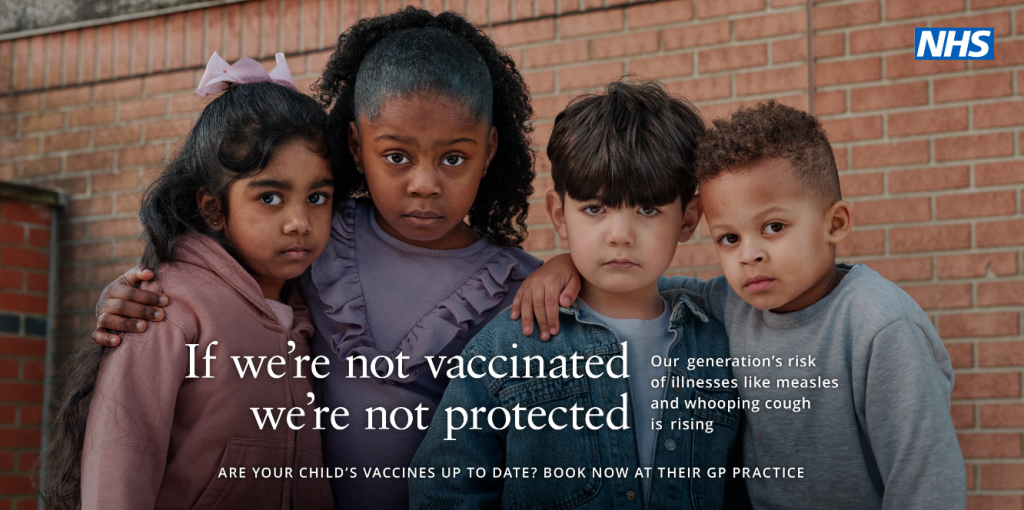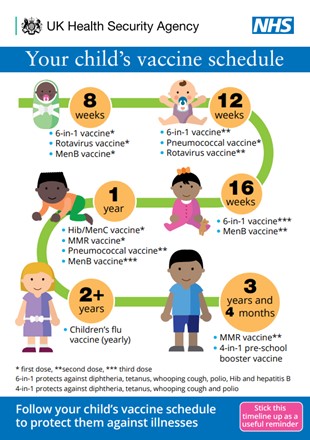Council supports new campaign to encourage take up of childhood immunisation programme
Shropshire Council’s public health team lead officers are urging parents and carers to ensure their child’s vaccinations are up to date.

Vaccination campaign landscape image
The call out is part of the national childhood immunisation campaign launched on Monday 4 March 2024 by NHS England and UKHSA (UK Health Security Agency). The campaign aims to encourage parents, whose children (0-5 years old) have missed or may miss a vaccine, to get vaccinated, and has been launched after seeing a drop* in vaccinations for measles and whooping cough.
As a result childhood infections like measles and whooping cough have been rising, with outbreaks across the country.
Such infections can have a huge impact on your child’s life. They can miss out on school due to time spent unwell, be hospitalised, and even experience lifelong complications, disability and in some cases tragically can cause death.
Childhood vaccinations give children the best protection and prevent over 5,000 deaths and over 100,000 hospital admissions each year in England.
Routine childhood immunisation schedule
It’s important that vaccines are given on time for the best protection. To have full protection, children sometimes need to have booster vaccines. You should check their red book. If your child missed a vaccine, contact your GP to catch up.

Your child’s vaccination schedule
How vaccines work
Vaccines work by causing the body’s immune system to remember the specific infection targeted in each vaccine. If your child comes into contact with an infection and they have had their vaccines, your child’s body will recognise that infection and quickly respond to fight off diseases like measles, mumps, rubella, whooping cough and more.
Cecilia Motley, Shropshire Council’s Cabinet member for adult social care and public health, said:-
“We know your child’s health is your top priority and so protecting them from serious disease is incredibly important. That is why the NHS offers a free childhood vaccine programme, safeguarding your child from certain illness.
“We understand that you may have questions about vaccine safety and effectiveness. All childhood vaccinations offered by the NHS have been used in millions of children and have an excellent safety record. All health authorities worldwide agree that immunisation is the safest way to protect our children’s health.
“If you do have any questions, do not hesitate to speak to your GP or health visitor; they will be happy to address any concerns and guide you through the vaccination schedule.”
Rachel Robinson, director of public health for Shropshire, added:-
“We want to really encourage parents and carers whose children have not received all their vaccinations to get fully vaccinated. All the childhood vaccinations are free.
“If your child isn’t vaccinated, they’re not protected. Childhood infections can cause serious illness, hospitalisation, lifelong disabilities, and in some cases death. Vaccines have been around for a long time, and they work. Because vaccines have been used so successfully in England, they prevent more than 5,000 deaths and more than 100,000 hospital admissions each year.
“Although it’s important that vaccines are given on time for the best protection, if you or your child have missed a vaccine, it is never too late to contact your GP to check if you can catch up.
“We also want to encourage older children and adults to ensure they’re up to date with their MMR vaccinations: it’s never too late and it will not only help protect you, but also those close to you.”
For the full childhood immunisation timetable and to see how to get them, visit the NHS website
Further information
- *Sadly, England no longer has the levels of population immunity recommended by the World Health Organisation of 95%, and this has led to increased risk for those who are unvaccinated or under-vaccinated. It means that infections like measles and whooping cough are rising.
- The UK’s childhood vaccination programme prevents around 5,000 deaths, and over 100,000 hospital admissions, each year in England.
- NHS England data shows if 95% of children receive the MMR vaccine, this would stop measles spreading completely. Measles, mumps and rubella can quickly spread again if fewer than 90% of people are vaccinated.
- NHS England also notes that, since vaccines were introduced in the UK, diseases like smallpox, polio and tetanus that used to kill or disable millions of people are either now gone or very rarely seen.
- Data from UKHSA show that, while measles can be mild for some children, one in five will require a hospital visit. Infection can lead to complications, such as meningitis and sepsis, in one in fifteen children.
- While most young children recover from Meningitis B, around 1 in 20 die from the infection. Many of those who survive have a permanent disability, such as brain damage, epilepsy, hearing loss, or the loss of limbs (amputation).
- The World Health Organisation (WHO) states 1 in 200 polio infections leads to irreversible paralysis. Among those paralysed, 5–10% die when their breathing muscles become immobilized.
- A recent study has shown that there is only 1 anaphylactic reaction in about a million immunisations.
- All medicines can cause side effects, but all health authorities around the world agree that immunisation is the safest way to protect our children’s health.

